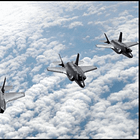Decoded: Defence Department's deadly deceits
After nine months of denial and disinformation, the Australian government has been forced to confirm its deadly exports to Israel
After spending nine months denying any weapons were going to Israel, senior Australian government ministers are now in damage control after a Defence Department official admitted for the first time since the Hamas attack on Israel on 7 October 2023 that there are active export permits relating to Israel that cover the transfer of parts and components.
Labor MPs from Prime Minister Anthony Albanese down have spent months attacking political opponents on this issue.
This was Defence Minister Richard Marles just weeks ago on ABC Melbourne radio: ‘So, to be clear, what the Greens are alleging is that somehow we are supplying Israel with weapons which are being used in the conflict in Gaza. That is absolutely false, and that is a total lie.’
Following the revelations about active permits, senior government ministers have doubled down and introduced a perverse phrase – ‘non-lethal parts’ – to defend the continued export of key parts and components into the F-35 fighter jet supply chain.
The F-35 is being used by Israel over Gaza, and the global supply chain, of which Australia is a key part, services this combat aircraft. In June, the US agreed to sell 25 more F-35 fighter jets to Israel.
More than 70 Australian companies have been awarded over $4.13 billion in global production and sustainment contracts through the F-35 program so far.
Minister Marles and Foreign Minister Penny Wong both recently referred to Australia’s export of ‘non-lethal parts’, having spent eight months insisting: ‘Australia is not sending weapons to Israel and has not done so for the past five years.’
Israel is accused of committing genocide in Gaza in a case that is before the International Court of Justice. Israel is also accused of deliberately causing the starvation of Palestinians in Gaza, according to the International Criminal Court. Australia’s response to both cases has been muted, at best.
‘Non-lethal’ parts
The F-35 would not operate without all its parts and components. Australia remains the sole source of a number of them, as I reported for Declassified Australia in April.
The proposition that the Australian parts used in a lethal weapon system could be separately considered ‘non-lethal’ indicates a government intent on damage control.
‘Lethal’ is the first word that arms manufacturer Lockheed Martin uses to describe its F-35 fighter jet. It markets the aircraft as the most lethal fighter jet in the world.
In a testament to that, in March the F-35A version was operationally certified to carry a nuclear bomb – the first fighter jet or bomber to be granted nuclear-capable status since the 1990s.

The UN Arms Trade Treaty (ATT) makes no mention of the lethality of the individual parts or components that comprise the weapons (“conventional arms”) it covers.
Two weeks ago, the UN published a damning report on Israel’s extensive use of heavy bombs with wide area effects in densely populated areas in Gaza since 7 October: ‘The scale of human death and destruction wrought by Israel’s bombing of Gaza…has been immense.’
High Commissioner for Human Rights Volker Türk said: ‘The requirement to select means and methods of warfare that avoid or at the very least minimise to every extent civilian harm appears to have been consistently violated in Israel’s bombing campaign.’
Last December, the head of the F-35 joint program office, Lieutenant General Michael Schmidt, gave evidence at a US Congressional hearing that confirmed Israel was using its F-35s in the bombing attacks.
Lt-Gen Schmidt said the F-35 program office had been moving ‘at a breakneck speed to support…Israel…by increasing spare part supply rates’.
Lockheed Martin has acknowledged that ‘every F-35 built contains some Australian parts and components’.
The government’s ‘non-lethal parts’ messaging is at odds with a significant UN statement issued on 20 June, which included and named multinational arms companies in its call to cease supplying Israel with arms, ‘even if [the arms transfers] are executed under existing export licenses’.
Under the headline ‘States and companies must end arms transfers to Israel immediately or risk responsibility for human rights violations’, the statement named 11 multinationals – including Lockheed Martin, BAE Systems, Boeing, Northrop Grumman, Rheinmetall and RTX/Raytheon – which all have significant operations in Australia.
‘These companies, by sending weapons, parts, components, and ammunition to Israeli forces, risk being complicit in serious violations of international human rights and international humanitarian laws,’ the statement said.

Government in damage control
The Albanese government was forced to employ new language following evidence given by a Defence Department official in a recent Senate Estimates hearing.
A deputy secretary with the Department, Hugh Jeffrey, stated that ‘around 66’ defence export permits ‘that relate to Israel’ remain active. He explained that ‘a certain proportion of those’ are ‘in relation to ADF [Australian Defence Force] capability’, meaning they are likely for the return of ADF equipment to Israeli arms-makers for repair or upgrade.
He continued: ‘The remaining elements of those permits range from parts and components to technology exports.’
This is the first time since the Hamas attack on 7 October that the Defence Department has admitted it has active permits relating to Israel that cover the export of parts and components.
Until this admission, no senior minister had acknowledged publicly that Australia was still exporting parts and components into the F-35 global supply chain or that Israel was using the fighter jet in its war on Gaza.
On ABC Insiders on 16 June, Foreign Minister Wong finally conceded that Australia was exporting parts into Lockheed Martin’s F-35 global supply chain.
She also confirmed that the government was required to comply with the Arms Trade Treaty, which Australia ratified in 2014: “We have to be consistent with that treaty, and we are, and we will be.”
Minister Wong then used the “non-lethal” phrase:
We have F-35s; they are the largest proportion of fast jets in the Royal Australian Air Force and we are part of 18 nations who are part of that consortia. We are involved in non-lethal parts, but of course we will always continue to consider, as Defence Estimates made clear, obligations under those treaties.
Five days earlier, Richard Marles had also admitted ‘there are a number of what I’d describe as non-lethal parts that are provided to the F-35s’.
What is a ‘weapon’?
The senior ministers were forced to change tack because the favoured line of all Labor MPs since Israel launched its newest and deadliest war against Palestine has cracked under sustained scrutiny.
The carefully crafted statement that ‘Australia is not sending weapons to Israel and has not done so for the past five years’ contains two elements designed to mislead: ‘weapons’ and ‘to Israel’.
All Labor MPs, including the Prime Minister, use the word ‘weapons’ repeatedly without defining it, knowing the vast majority of Australians will assume it means ‘weapons’ in the usual broad sense.
However, the government is cynically relying on a narrow military definition.
The Defence Department’s Hugh Jeffrey, in a previous Senate hearing, said the Department’s chosen definition of ‘weapon’ was ‘derived from’ definitions in the UN Arms Trade Treaty (ATT), ‘which classifies what weapons are’.
‘Under the UN definition, weapons are defined as whole systems, like armoured vehicles, tanks and combat helicopters,’ he said.
However, the ATT does not use the word ‘weapons’ in this broad sense; it uses the term ‘conventional arms’. The treaty says in Article 2 that it applies to ‘all conventional arms within the following categories’:
Battle tanks
Armoured combat vehicles
Large calibre artillery systems
Combat aircraft
Attack helicopters
Warships
Missiles and missile launchers
Small arms and light weapons
The next two articles in the ATT refer to ‘ammunition/munitions’ (Article 3) and ‘parts and components’ (Article 4). These military products are also included under the treaty’s prohibitions, meaning that their export must also cease if they are being used in serious violations of international law.
In all its previous public statements, the Albanese government had ignored Article 3 and Article 4.
The Defence Department also continues to insist that parts and components are not ‘weapons’.
‘To Israel’
Military exports – including ammunition, munitions, parts and components – do not need to travel directly ‘to Israel’ to be prohibited under the ATT.
Governments are required to find out where their weapons will, or may, end up and then make responsible decisions that comply with the treaty.
Using arms trade lingo, a government must consider and assess the potential ‘end users’ of its military exports.
The people drafting the ATT knew how the (legal) arms trade works – a trade that is widely considered the most corrupt of all. Countries regularly export weapons via third party countries. This can be for legitimate reasons but is also often to try to hide their tracks.
International legal obligations
The Arms Trade Treaty and the Geneva Conventions are clear on human rights responsibilities.
Article 6.3 of the ATT states that a nation state should not authorise any transfer of conventional arms if it has knowledge at the time that the items would be used in the commission of genocide, crimes against humanity, grave breaches of the Geneva Conventions of 1949, or other war crimes.
Article 7.1 states that the exporting nation must assess the potential for the conventional arms to commit or facilitate a serious violation of international humanitarian law or international human rights law. Article 7.4 adds that this requirement also includes ammunition, munitions, parts and components.
UN experts referred to the Geneva Conventions when warning countries that any transfer of weapons or ammunition to Israel that would be used in Gaza was likely to violate international humanitarian law:
‘States must accordingly refrain from transferring any weapon or ammunition – or parts for them – if it is expected…that they would be used to violate international law.
‘Such transfers are prohibited even if the exporting State does not intend the arms to be used in violation of the law…as long as there is a clear risk.’
This article was first published at Declassified Australia on 1 July 2024





Michelle, don't let politicians condemn your credibility by Australia's major media Hyenas or attempt to discredit your factual research.
Beware the Noahide laws.
Blessings and appreciation from Sydney.